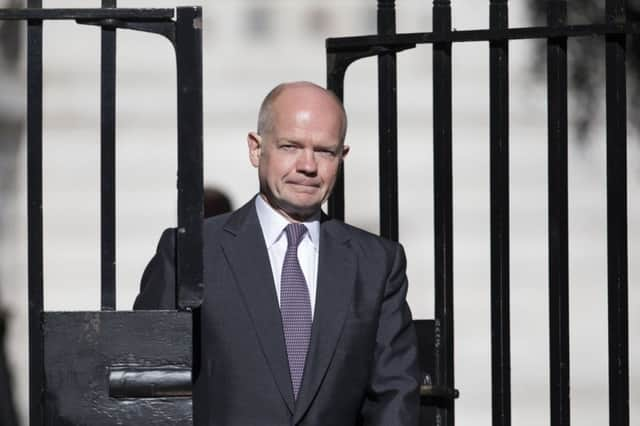Clarke and Hague out in Cameron cabinet reshuffle


Former Tory leader Mr Hague is to step down as an MP at the next General Election after resigning from his Cabinet post.
The news came as Mr Cameron prepared for a major overhaul of his government over the next 24 hours.
Advertisement
Hide AdAdvertisement
Hide AdIt is believed Mr Hague will be replaced by Defence Secretary Philip Hammond. The Prime Minister said Mr Hague had been one of the Conservative Party’s “leading lights” for a generation and had been a “close confidante, wise counsellor and great friend”.
However, Mr Hague will remain in the Cabinet as Leader of the Commons, replacing Andrew Lansley, and will lead the Tory campaign in key constituencies, particularly in northern England.
The shock announcement follows the widely expected decision by Ken Clarke to retire at 74, ending a career in government stretching back to 1972.
Amid speculation that he would be sacked to make room for a new-look Cabinet, Mr Clarke resigned from office 32 years after he was first appointed as a junior transport minister by Margaret Thatcher.
The departure of the last “big beast” from the pro-European left of the party was also likely to herald the return of the right-wing eurosceptic Scot Dr Liam Fox two and a half years after being forced to resign as defence secretary.
Mr Clarke is to be joined on the back-benches by the centrist David Jones who was sacked as Welsh Secretary. Attorney General Dominic Grieve also exited, as did Environment Secretary Owen Paterson and energy minister Greg Barker.
Universities minister David Willetts, who sits in at Cabinet, and chief whip Sir George Young were also expected to be shown the door. Reports also suggested international development minister Alan Duncan, Andrew Robathan from the Northern Ireland Office and policing minister Damian Green were also to leave the government.
The biggest winners were expected to be four women – Treasury minister Nicky Morgan, defence minister Anna Soubry, schools minister Elizabeth Truss and employment minister Esther McVey – who are all expected to be handed Cabinet jobs.
Advertisement
Hide AdAdvertisement
Hide AdThe move is meant to help towards meeting Mr Cameron’s pledge that one third of his ministers will be women and comes after a television camera caught an all male front-bench at Prime Minister’s Questions.
Ms McVey and Work and Pensions Secretary Iain Duncan Smith were seen entering No 10, but a source close to Mr Duncan Smith insisted the meeting was about “departmental” business.
Mr Clarke told friends that he is looking forward to spending more time watching cricket.
He had smiled and waved to photographers as he entered No 10 earlier. In his resignation letter, Mr Clarke made it clear that he would continue to oppose attempts to make the party more eurosceptic. He wrote: “We must not diminish Britain’s ability to influence events. I know that you are quite determined to have a referendum on the subject, in which I will be campaigning vigorously for a vote to keep us in the Union.”
There was growing speculation that Eric Pickles could be shifted to chief whip, with his communities and local government brief handed to a new Cabinet entrant.
Mr Cameron also needs to identify a new commissioner to represent the UK in Brussels.
He is thought to be reluctant to select an MP and trigger a by-election that would suck up valuable resources. Former Tory leader Lord Howard of Lympne is among those being touted as a candidate.
Conservative ‘big beast’ bids farewell to the jungle … again
Advertisement
Hide AdAdvertisement
Hide AdTory big beast Ken Clarke has brought an end to a ministerial career which began in 1972 – when David Cameron was just five years old.
He had already been demoted in the 2012 reshuffle, losing his post as justice secretary following a series of clashes with Home Secretary Theresa May.
Now the 74-year-old Nottinghamshire miner’s son has quit as minister without portfolio, concluding a career which saw him hold government posts under four different Conservative prime ministers.
His affable nature combined with his love of beer and sport have made him an often popular figure with the public, but his more liberal views on crime and strident pro-European stance have made him unpopular with many in the party.
He has also attracted controversy for his business interests, including a highly paid vice-chairmanship of British American Tobacco.
Known for his love of jazz and cigars, the MP for Rushcliffe became a Conservative at Cambridge, where he was president of the Union in 1963.